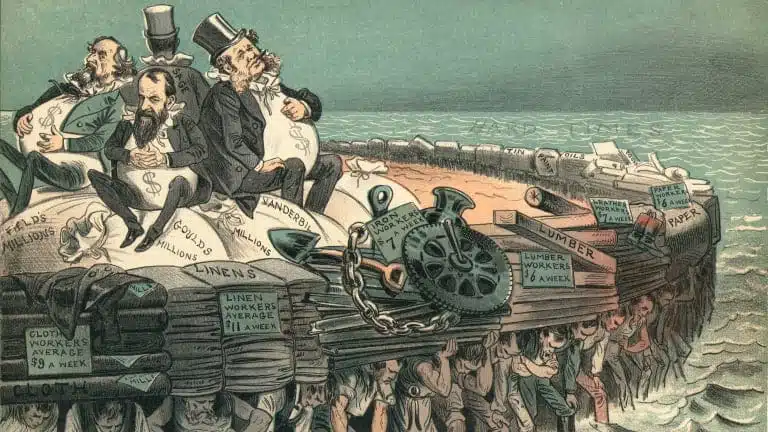By the time those born around the time of the Civil War””like social reformer Jane Addams, three-time presidential nominee William Jennings Bryan and their peers””came of age, nearly every aspect of their world had changed. Between the 1870s and the dawn of the 20th century, Americans witnessed revolutions in daily life, from what they wore to how they traveled to where they resided to how they spent their leisure time. As the so-called Gilded Age took shape, transformations in technology, culture and politics ushered in modern America, for better and for worse. Mark Twain, who coined the moniker “The Gilded Age” in his 1873 novel of the same name, used it to describe the era’s patina of splendor””gilded, after all, is not gold””and the shaky foundations undergirding industrialists’ vast accumulation of wealth.
smothsonianmag.com
I have not watched HBO’s series The Gilded Age. Nor have I read the novel in which the great American author, speaker, and satirist Mark Twain coined the phrase. I am familiar with the period between the end of the Civil War and the turn of the century, the period of rising industrialism and the amassing of insane wealth by men like John D. Rockefeller and Commodore Vanderbilt. It was the birth of the modern age, the age of mass production and convenience, the age of aspiration and inspiration. Like every age before it and every age since it was built on the backs of common people doing their best to carve out a living.
Twain called it The Gilded Age because he saw the shiny gold as a thin veneer of something not so grand as it appeared.
Gilded definition
1. covered or highlighted with gold or something of a golden color
2. having a pleasing or showy appearance that conceals something of little worth
The COllins Dictionary
All that glitters is not gold!
William Shakespeare borrowed this sentiment, which had been expressed from as early as the 12th century, and coined it in a way we could remember – and write songs about, such as Dan Seals’ song, Everything that glitters is not Gold.
And, oh the crowd will always love you
But as for me I’ve come to know
Everything that glitters is not gold
Everything that glitters is not gold
Like no other time since that time, the current age seems most like The Gilded Age to me. Because of the dizzying progress of humankind through technological advances, we have the world at our fingertips. We are so spoiled by instant gratification that if this website did not load in a second or two, you would not likely have hung around to read this article. (The fact that you are reading anything more than a Meme or textspeak sort of makes you an odd duck in this age, anyways. Thank you.) Saying that knowledge and convenience change exponentially is trite. The things my generation takes for granted today only a minute percentage dared to dream when we were kids – or even young adults. When we were kids, the cartoon The Jetsons seemed so futuristic and far-fetched, just fantasy. Today, it is a silly understatement. The future turned out to be more technologically amazing than those writers imagined.
So, why are we so sad?
We have never had it better. We have never enjoyed more convenience, more access, and more opportunity. The children of The Gilded Age were likely to find themselves in industrial sweatshops for 60-80 hours per week. Our kids spend that much time imagining they are in conflict from their gaming chairs while hollering at their moms for snacks.
But all that glitters is not gold. Like many in The Gilded Age, we live with disillusion, depression, and even despair. Watching the commercial-fueled version of Hulu is enough to make you want to order what every other advertisement is pushing like a pimp. Hims for the guys and Hers for the girls dealing with low self-esteem, allegedly due to chemical imbalances.
A 2020 article in Psychology Today reported that 13% of Americans take antidepressants. That was three years ago!
How much like Twain’s Gilded Age sentiments do we find our current state?
“It is a time when one’s spirit is subdued and sad, one knows not why; when the past seems a storm-swept desolation, life a vanity and a burden, and the future but a way to death. It is a time when one is filled with vague longings; when one dreams of flight to peaceful islands in the remote solitudes of the sea, or folds his hands and says, What is the use of struggling, and toiling and worrying any more? let us give it all up.”
Mark Twain, The Gilded Age
Words like “desolation,” “vanity,” and “burden” seem much too familiar. “Dreams of flight to peaceful islands” are common sentiments among those burned and burned out by constant contact, neverending interactions, and sensory overload. We stare into the glare of a computer screen by day and attempt to fall asleep with the glow of the iPhone screen by night. And what about those “vague longings”? Who does not battle those? Too often, we medicate them either with prescription drugs or the dopamine rush of “likes” and “loves” on our social media posts. Or maybe by hitting someone with a zinger in the comments section.
What about the high cost of keeping up?
What our grandparents would have considered luxuries, we call essentials. In fact, we call things essential that they hadn’t heard or dreamt of. So, we sacrifice the future since it is so far away on the altar of today. We have more credit cards than a deck of cards. Mortgages, car payments, furniture on payments plans…
You know, the things we need.
Beautiful credit! The foundation of modern society. Who shall say that this is not the golden age of mutual trust, of unlimited reliance upon human promises? That is a peculiar condition of society which enables a whole nation to instantly recognize point and meaning in the familiar newspaper anecdote… ‘I wasn’t worth a cent two years ago, and now I owe two million dollars.”
Mark Twain, The Gilded Age
Everybody is here and I am all alone.
Twain described a loneliness that seemed out of place in such a magnificent time of advancement when there was more to bring people together and better ways of getting them together than ever in human history. But The Gilded Age pales in comparison to this one for that kind of irony. We are always connected to everyone we want to be connected with and plenty of people we do not. We are never more than a phone call, a text, an instant message, or a social media notification away. Never.
So, why do so many feel isolated and lonely?
I joined a poetry page on Facebook and started scrolling. I saw that this 20-something girl in Great Britain had just joined. She wrote a post to introduce herself to the group (which is massive in number). The entire post was about her depression, her disillusion, her sadness, and how she has been let down or betrayed by others. Then she added, “Anyway, I am glad to be part of the group (smiley face).”
I wondered how many groups, and how many places she shared her troubles, searching for encouragement, understanding, and help. And how many more like her?
Great! So, what do I do?
If this has described how you feel or where you are in this Gilded Age of Constant Contact, what can you do to avoid the depression trap? How do you feel better about your place in the world? Where do you find peace?
I have a few suggestions:
- Start with Jesus. There is more than companionship in Christ; there is communion. He loves you and cares for you inside out.
- Seek peace over happiness. Peace is greater than happiness because happiness is circumstantial. Not only is happiness not always possible; it is not always appropriate. Some things are sad and being happy about them would be weird at best and sociopathic at worst. But inner peace is always in good taste and will sustain you, even through sadness. By the way, guess who is called the Prince of Peace? Yes! Jesus.
- Give more than you take. Stop looking for people and things to prop you up. You will never get what you want. Even if you do, it will never be enough. Divorce, depression, and suicide are just as prevalent among the wealthy and famous as anywhere else, maybe more so. Why? Are we just creatures destined for drama? Or are we doing it wrong? The answer is the latter. How do I know? Jesus told me so. He said, “Give and it shall be given unto you, good measure, pressed down, shaken together, and running over…” (Gospel of Luke 6:38, the Holy Bible)
Moving from Twain to Dickens. Charles Dickens, who shared Twain’s view of the dichotomy of industrial progress, opened his timeless novel A Tale of Two Cities with these words:
It was the best of times, it was the worst of times, it was the age of wisdom, it was the age of foolishness, it was the epoch of belief, it was the epoch of incredulity, it was the season of light, it was the season of darkness, it was the spring of hope, it was the winter of despair.
Charles Dickens, A Tale of Two Cities
Charles Dickens was describing the same time period in both glowing and despairing terms because it was both and so is this Age of Constant Contact. It will be for you what you make it.

